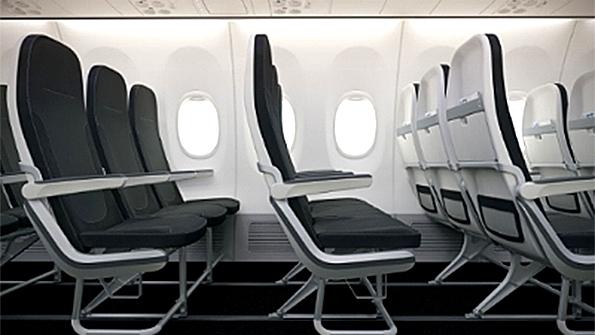
It’s likely going to be a long recovery from the COVID traffic slump, especially for business travelers and international traffic. Indeed, there are worries now that business travel may not fully recover.
Oliver Wyman Partner Scot Hornick thinks carriers may thus reduce business-class cabins, converting the space to premium economy or economy. Or less certain carriers might adopt quick-change seats that enable efficient configuration changes without moving in-cabin monuments. Ideaworks CEO Jay Sorensen predicts some space given to lie-flat seats will be reallocated to premium economy.
What are aircraft seat-makers seeing and expecting? Some hints of change, but mostly caution for the moment, a focus on narrowbodies and a permanent emphasis on hygiene.
Alastair Hamilton, VP sales & marketing at Collins, is seeing very limited movement to less premium, more main cabin configurations, but so far no general trend. “Most airlines seem to be conserving cash and watching the market very closely rather than making significant investments at this time.”
To enable change when and if it does come, Collins offers its Meridian seat in pre-certified configurations so operators can reconfigure narrowbody aircraft much more quickly that the traditional two-year lead times. “We have experienced increasing interest and demand for this solution over recent months, particularly in the leasing market,” Hamilton says.
The Collins exec expects different carriers to reach different decisions based on different finances and different performance in their key markets. But one current trend he expects will be universal: “The heightened attention to cleanliness is here to stay. Airlines and passengers alike are expecting products that are visibly clean [and] can hold up to more frequent and intense cleaning regimens . . .”
Hamilton predicts surfaces and coatings with inherent antimicrobial properties to become standard, not just for seats, but for all high-traffic touchpoints in the cabin. Also important will be fabrics and materials that are easily cleaned and minimize areas where dirt and grime can congregate, all while maintaining durability, color and softness.
Neil Cairns, CEO of Acro Aircraft Seating, is also seeing only slight signals of reconfigured cabins. Cairns cites one of his significant Asia-Pacific customers that is considering replacing domestic business class seats with an all-economy class cabin. “But, so far at least, that seems to be an isolated example.”
And even during the pandemic Acro is seeing heightened interest in its Series 7 domestic business class seat for narrowbodies. Cairns attributes this interest to the business recovery in larger domestic markets such as China and the U.S. “Indeed, one of our customers is currently changing its business model from all-economy to dual-class cabin.”
Still, Acro is re-imagining its portfolio of economy class seats. One improvement will be less layering and reduced part counts to enable speedy, effective sanitizing.
Acro has not so far seen a need to develop quick-change seats, but Cairns notes all Acro seats can be re-pitched and removed quickly on-wing.
The Acro exec is seeing his Asia-Pacific customers increasingly use narrowbodies for long-haul flights, and his Series 6 seats are proving popular on these aircraft. His market began to pick up at the end of 2020 when Acro secured some significant wins, including retrofit orders from lessor companies.
“We recently won the contract for a 30 shipset line-fit order for Series 6 from a Middle Eastern carrier and secured an important contract for our Series 7 Domestic Business Class seat, establishing a business relationship with a new airline customer operating in Asia-Pacific as well as in Europe.”
So confidence in recovery is increasing, especially in domestic markets. And Cairns believes Airbus’s A321XLR will give the industry a boost. “Its combination of single-aisle economics with long-haul widebody cabin comfort is a timely development when reduced air travel is prompting an increase in the use of single-aisle aircraft on longer, less busy routes.”
Cairns concurs with Hamilton on the importance of hygiene and cites Acro designs that facilitate deep cleaning during quick turnarounds and the company’s work on antimicrobial technology.





